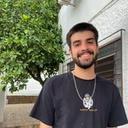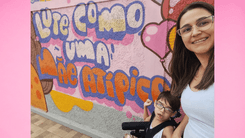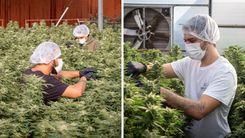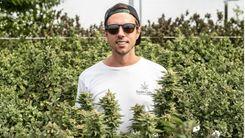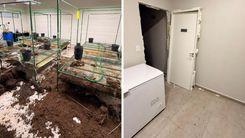After four months in prison, medical cannabis patient receives judicial recognition for personal use
The student accused of drug trafficking for growing cannabis is acquitted of the charges and is now facing trial while free
Published on 11/13/2025

Cannabis cultivation by patient Vinícius, who was arrested at his home in the state of São Paulo on May 22, 2025. Image: Illustrative generated by Artificial Intelligence
Vinícius (last name preserved), 36 years old, mechanical engineering student and medical cannabis patient, was arrested at his home in the state of São Paulo on May 22, 2025. He was accused of growing cannabis for illegal sale.
After spending four months in pretrial detention under what he described as "inhumane" conditions, the Justice system downgraded the trafficking accusation to personal use (Article 28). Vinícius is now facing trial while free.
From the outset, he fought to prove that the cultivation found by the police was solely intended for producing his own oil and for vaporized use, to manage anxiety crises, ADHD, and as an aid in the treatment against chemical dependency.
From Addiction to Medicine
Vinícius' relationship with the plant is complex. His first contact was at 15 years old, "not as medicine, but as a drug," he comments. "I got to cocaine, not because of cannabis, but because of the environment I lived in. I went through hospitalizations and a first arrest in 2018," he says.
Amidst the struggle, cannabis helped him rise again. "I saw that the plant was important when it came to leaving that cocaine addiction behind," he explains.
About two years later, in 2020, already away from prison, Vinícius witnessed the medicinal power of cannabis after observing the effect of cannabis oil on his wife's grandmother, diagnosed with Alzheimer's. "It took about ten days. It improved her memory and quality of life by 90%. It was tremendous," he says.
This episode prompted him to study the plant for his own conditions. Vinícius started treatment with a doctor in 2024, obtaining authorization from the National Health Surveillance Agency (Anvisa) to import medications and purchasing oil from cannabis associations.
However, the high cost prevented him from continuing. The solution was found in medical cultivation. "The first flower I smoked was mine. Before that, it was just 'pressed'," he says.
He started with six plants, but had recently expanded to about 15, seeking a "more potent medicine." "I needed a slightly higher dose. My body no longer felt the same relaxation. It was necessary to adjust the doses," he explains.
The Arrest for Cultivation and the Legal Battle
The arrest occurred while Vinícius was in the process of judicialization to obtain a writ of habeas corpus that would give him the legal right to cultivate.
Police raided his house — where his wife's legalized tanning salon also operates — based on a warrant issued after a report that there was "cultivation of marijuana in his own residence for subsequent commerce."
The officers found four plants in a flowering state and 20 seedlings, as well as jars of oil, greenhouses, pH meters, and fertilizers.
During detention, Vinícius' defense obtained a groundbreaking judicial decision. On August 22, 2025, the judge from the State Department of Criminal Execution of Presidente Prudente, formally authorized the entry of the medication into the prison.
The decision was considered a legal victory, as it was based on Article 43 of the Penal Execution Law and went against the opinions of the prison's management — who claimed the oil was "unnecessary" — and the Public Prosecutor's Office, which had requested the case to be closed.
The decision mandated the delivery of a full-spectrum medication, with cannabidiol (CBD) and tetrahydrocannabinol (THC), to the Provisional Detention Center of Álvaro de Carvalho (SP), where Vinícius was imprisoned.
The oil would be used to treat his diagnoses of "mixed anxiety and depressive disorder" and "sleep disorder." However, the treatment never arrived. "The week the oil was supposed to enter, they transferred me. They transferred me to another jail to make it difficult," Vinícius explains.
Attorney Natan Duek, responsible for the case, in partnership with attorney Max Warner, explains the favorable ruling for the entry of cannabis oil into the Detention Center during Vinicius' detention:
Patient Reports 'Inhumane' Conditions in Detention
Vinícius describes the horror of the four months he spent in the system. In the first unit, he depicts a degrading scenario. "I went four days without brushing my teeth, without taking a shower. It's inhumane. It's a hole in the ground and a hole in the wall where water comes out," he says.
He was also forced to set aside the medicinal use of cannabis and return to Clonazepam and Sertraline to be able to sleep.
Vinícius states that the psychological suffering was greater than in his first imprisonment. "The fear was constant. I knew I wasn't doing anything wrong, but the State's injustice is sometimes greater," he says.
After the transfer, the situation did not improve. "Twenty-eight inmates in a cell with a capacity for 12. Rats running over us. Horrible," Vinícius says. He mentions that he lost 20 kilograms during that period.
From Trafficker to Patient
The turnaround came in the final hearing, culminating in the sentence by Judge José Augusto França Júnior, on October 14, 2025. At a crucial point in the process, the Public Prosecutor's Office, in its final allegations, requested the downgrading of the trafficking crime to personal use (Article 28).
The defense presented crucial witnesses and technical reports. A doctor stated in court that Vinícius needed both the oil and the "inhalation of the substance" (flowers).
The doctor also affirmed that for patients without financial means, "home cultivation is preferable" to resorting to trafficking. In the sentence, the judge accepted the argument, applying the principle of in dubio pro reo (in doubt, in favor of the accused).
The judge highlighted the "absence of any information about sales to third parties," the lack of "instruments commonly associated with trafficking" (such as divided money or notes), and the fact that the movement in the house was "properly explained" by his wife's beauty salon.
The judge ruled the action partially valid, sentencing Vinícius under Article 28 (personal use) to six months of community service. The penalty was reduced due to the over four months he spent in pretrial detention.
The Post-Release Dilemma
Today, almost two months after being released, the medical cannabis patient still feels the impacts. "My mental health hit rock bottom," he admits.
He has not returned to taking psychiatric medications, but he faces a dilemma: he is afraid to cultivate and be arrested again, but he cannot afford imported oil.
"I'm living off pressed now. I smoke and use a little bit of oil, depending on the crisis. It's what I have."
